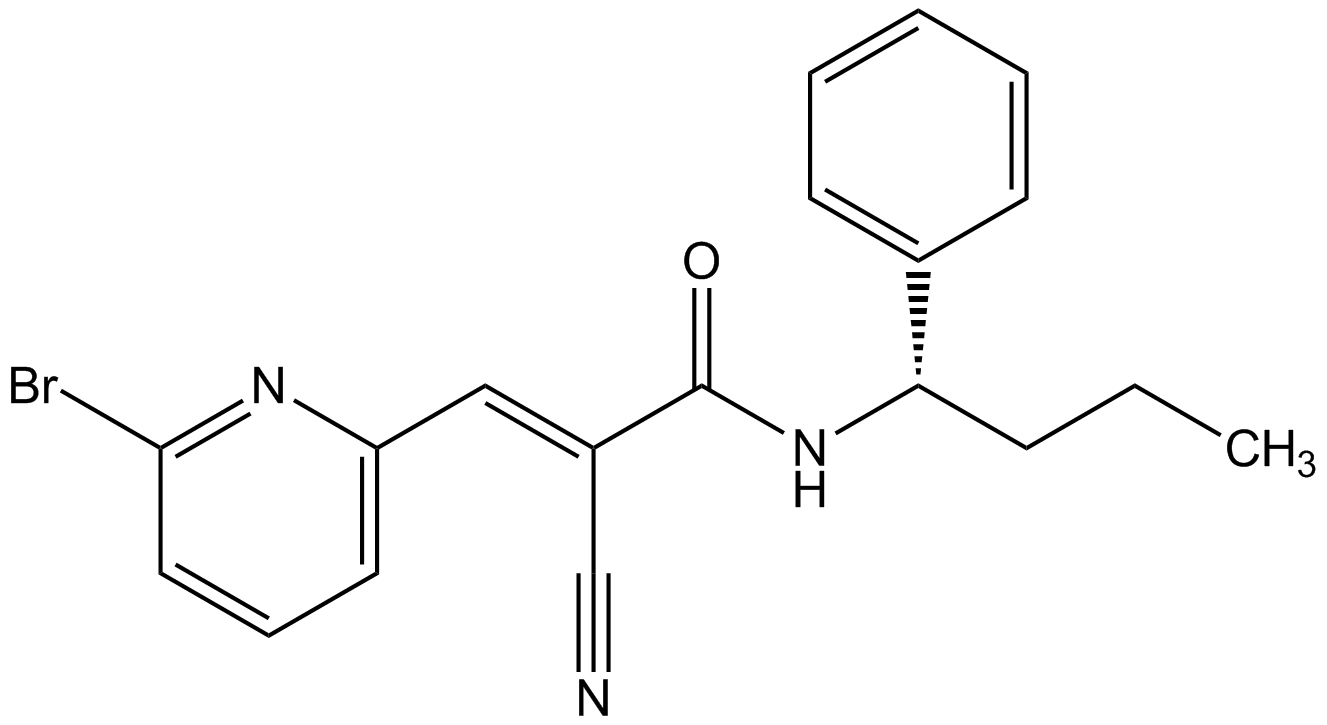WP1130
| Code | Size | Price |
|---|
| AG-CR1-3551-M001 | 1 mg | £40.00 |
Quantity:
| AG-CR1-3551-M005 | 5 mg | £100.00 |
Quantity:
Prices exclude any Taxes / VAT
Overview
Regulatory Status: RUO
Shipping:
AMBIENT
Storage:
Short term storage:+4°C. Long term storage:-20°C.
Images
Documents
Further Information
Alternate Names/Synonyms:
WPI 130; Degrasyn; (2E)-3-(6-Bromopyridin-2-yl)-2-cyano-N-(1-phenylbutyl)acrylamide
Appearance:
White to off-white solid.
CAS:
856243-80-6
EClass:
32160000
Form (Short):
solid
Handling Advice:
Protect from light.
InChi:
InChI=1S/C19H18BrN3O/c1-2-7-17(14-8-4-3-5-9-14)23-19(24)15(13-21)12-16-10-6-11-18(20)22-16/h3-6,8-12,17H,2,7H2,1H3,(H,23,24)/b15-12+/t17-/m0/s1
InChiKey:
LIDOPKHSVQTSJY-VMEIHUARSA-N
Long Description:
Chemical. CAS: 856243-80-6. Formula: C19H18BrN3O. MW: 384.3. WP1130 is a second-generation tyrphostin derivative initially identified as a JAK2 signaling inhibitor through JAK2 ubiquitination that reduces STAT activation stimulated by cytokines (such as IL-6 and IL-3) through the rapid down-regulation of upstream JAK kinases. WP1130 has also been identified as a partially selective cell permeable deubiquitinating enzyme/deubiquitinase (DUB) inhibitor that directly inhibits DUB activity of USP9x, USP5, USP14, USP24, UCH37, UCHL1 and UCHL5, leading to rapid accumulation of polyubiquitinated (K48/K63-linked) proteins into juxtanuclear aggresomes and tumor cell apoptosis, accounting for its anti-cancer properties. Through this mechanism, WP1130 has been shown to downregulate the antiapoptotic proteins Bcr/Abl and Jak2 and to upregulate the proapoptotic proteins MCL-1 and p53. WP1130-induced apoptosis and anti-proliferation in tumor cells have been implicated in the treatment of chronic myelogenous leukemia (CML), melanoma, glioblastoma and myeloproliferative disorders. It has also been shown to inhibit autophagy. WP1130 exhibits antiviral activity through activation of the unfolded protein response (UPR) and is an antibacterial compound against S. aureus including clinically isolated MRSA strains. WP1130 inhibits the LPS/ATP-induced deubiquitination of NLRP3 and further increases NLRP3 ubiquitination. This leads to inhibition of NLRP3 activation, indicating that deubiquitination of NLRP3 by the priming and activation signals is critical for its activation.
MDL:
MFCD18839228
Molecular Formula:
C19H18BrN3O
Molecular Weight:
384.3
Package Type:
Vial
Product Description:
WP1130 is a second-generation tyrphostin derivative initially identified as a JAK2 signaling inhibitor through JAK2 ubiquitination that reduces STAT activation stimulated by cytokines (such as IL-6 and IL-3) through the rapid down-regulation of upstream JAK kinases. WP1130 has also been identified as a partially selective cell permeable deubiquitinating enzyme/deubiquitinase (DUB) inhibitor that directly inhibits DUB activity of USP9x, USP5, USP14, USP24, UCH37, UCHL1 and UCHL5, leading to rapid accumulation of polyubiquitinated (K48/K63-linked) proteins into juxtanuclear aggresomes and tumor cell apoptosis, accounting for its anti-cancer properties. Through this mechanism, WP1130 has been shown to downregulate the antiapoptotic proteins Bcr/Abl and Jak2 and to upregulate the proapoptotic proteins MCL-1 and p53. WP1130-induced apoptosis and anti-proliferation in tumor cells have been implicated in the treatment of chronic myelogenous leukemia (CML), melanoma, glioblastoma and myeloproliferative disorders. It has also been shown to inhibit autophagy. WP1130 exhibits antiviral activity through activation of the unfolded protein response (UPR) and is an antibacterial compound against S. aureus including clinically isolated MRSA strains. WP1130 inhibits the LPS/ATP-induced deubiquitination of NLRP3 and further increases NLRP3 ubiquitination. This leads to inhibition of NLRP3 activation, indicating that deubiquitination of NLRP3 by the priming and activation signals is critical for its activation.
Purity:
>95%
SMILES:
BrC1=NC(/C=C(C#N)/C(N[C@@H](CCC)C2=CC=CC=C2)=O)=CC=C1
Solubility Chemicals:
Soluble in DMSO (25mg/ml) or ethanol (10mg/ml).
Transportation:
Non-hazardous
UNSPSC Number:
12352200
Use & Stability:
Stable for at least 2 years after receipt when stored at -20°C.
References
Activation of a novel Bcr/Abl destruction pathway by WP1130 induces apoptosis of chronic myelogenous leukemia cells: G. Bartholomeusz, et al.; Blood 109, 3470 (2007) | Degrasyn activates proteasomal-dependent degradation of c-Myc: G. Bartholomeusz, et al.; Cancer Res. 67, 3912 (2007) | Deubiquitinase inhibition by small-molecule WP1130 triggers aggresome formation and tumor cell apoptosis: V. Kapuria, et al.; Cancer Res. 70, 9265 (2010) | Bcr-Abl ubiquitination and Usp9x inhibition block kinase signaling and promote CML cell apoptosis: H. Sun, et al.; Blood 117, 3151 (2011) | A novel small molecule deubiquitinase inhibitor blocks Jak2 signaling through Jak2 ubiquitination: V. Kapuria, et al.; Cell Signal. 23, 2076 (2011) | Antiviral activity of a small molecule deubiquitinase inhibitor occurs via induction of the unfolded protein response: J.W. Perry, et al.; PLoS Pathog. 8, e1002783 (2012) | Non-transcriptional Priming and Deubiquitination Regulate NLRP3 Inflammasome Activation: C. Juliana, et al.; J. Biol. Chem. 287, 36617 (2012) | Deubiquitinases Regulate the Activity of Caspase-1 and Interleukin-1beta Secretion via Assembly of the Inflammasome: G. Lopez-Castejon, et al.; J. Biol. Chem. Immunol. 288, 2721 (2013) | Targeting deubiquitinase activity with a novel small-molecule inhibitor as therapy for B-cell malignancies: L.F. Peterson, et al.; Blood 125, 3588 (2015) | Deubiquitinase inhibition by WP1130 leads to ULK1 aggregation and blockade of autophagy: S. Driessen, et al.; Autophagy 11, 1458 (2015) | WP1130 reveals USP24 as a novel target in T-cell acute lymphoblastic leukemia: H. Luo, et al.; Cancer Cell Int. 19, 56 (2019) | Degrasyn exhibits antibiotic activity against multi-resistant Staphylococcus aureus by modifying several essential cysteines: K.M. Lee, et al.; Chem. Commun. (Camb). 56, 2929 (2020) | Deubiquitination and Activation of the NLRP3 Inflammasome by UCHL5 in HCV-Infected Cells: A. Ramachanfran, et al.; Microbiol. Spectr. 9, e00755-21 (2021) | Deubiquitinating Enzyme Inhibitors Block Chikungunya Virus Replication: L.S. Lopez, et al.; Viruses 15, 481 (2023)



